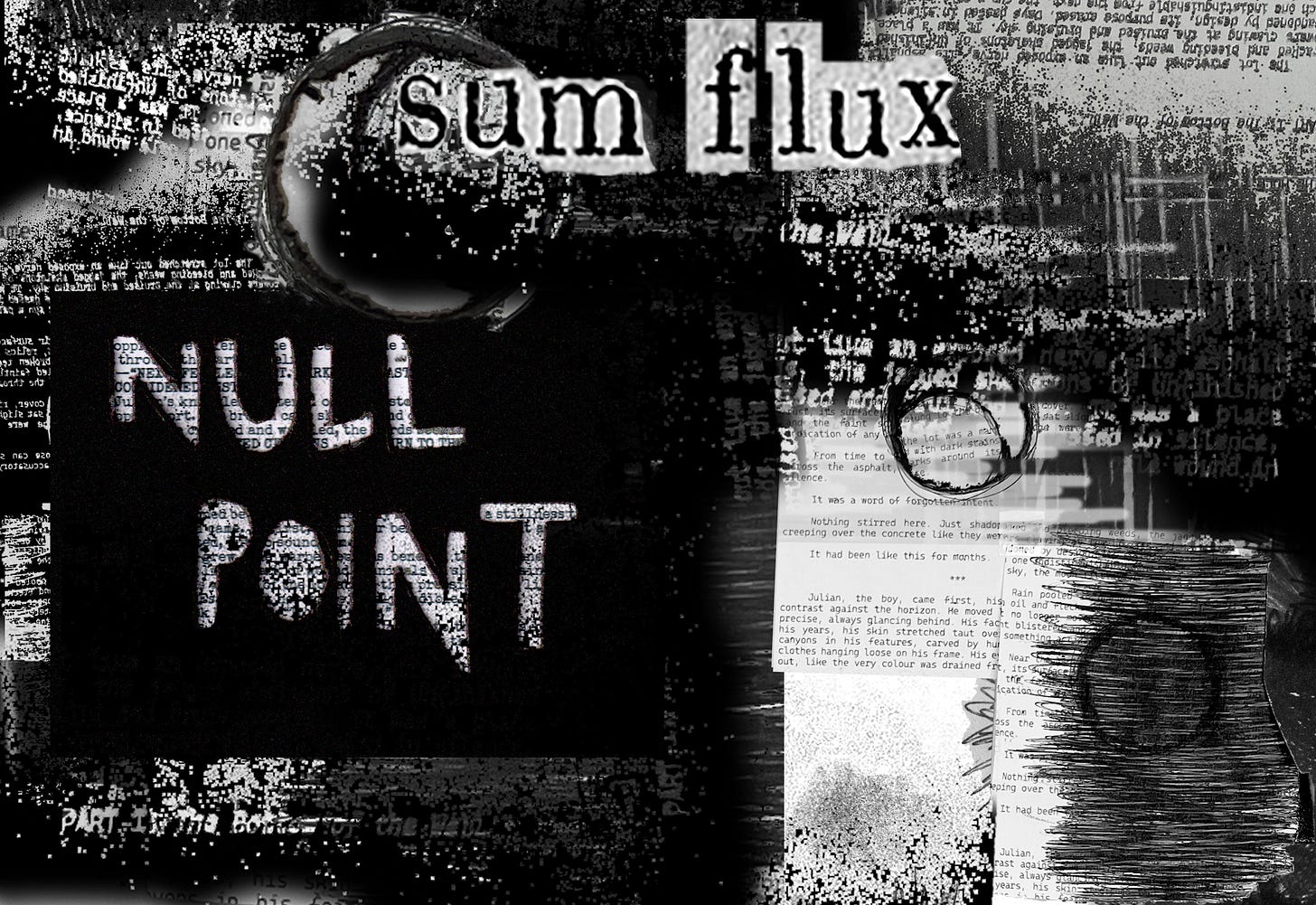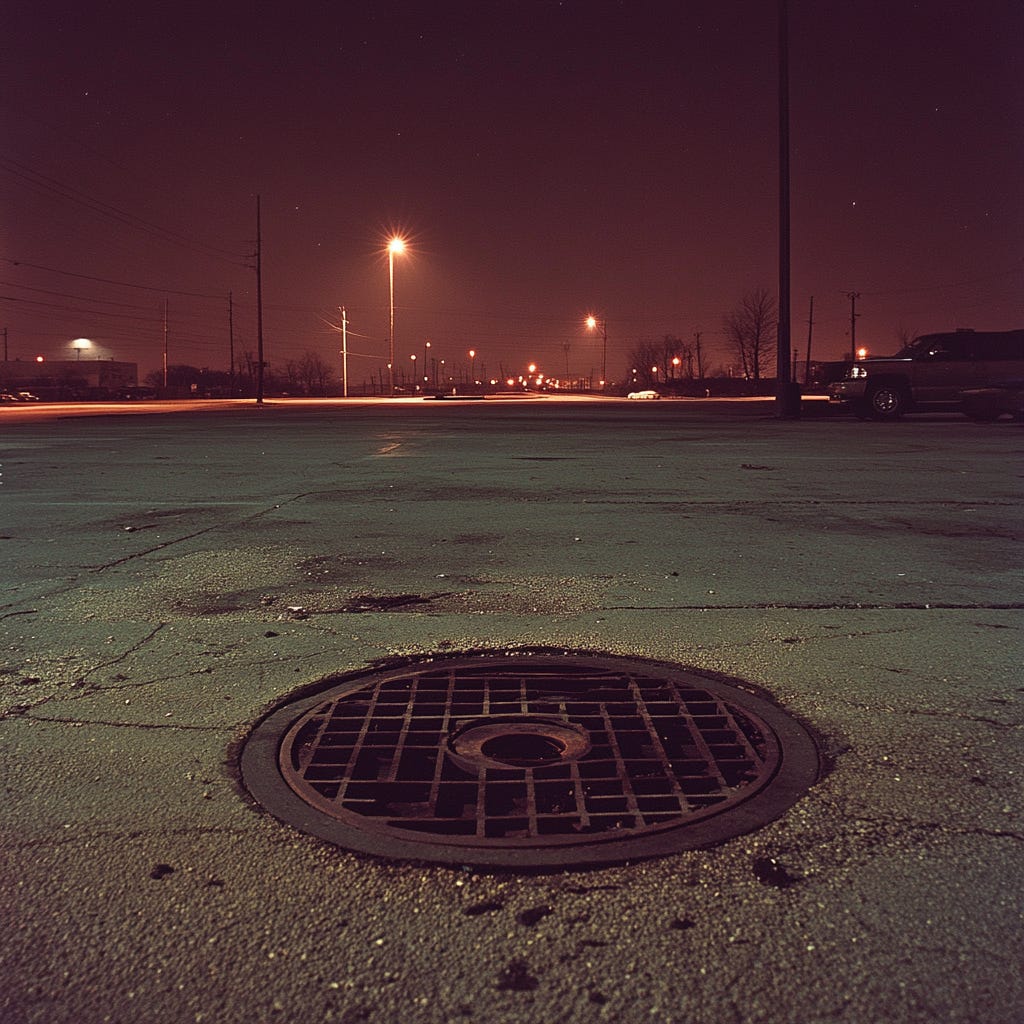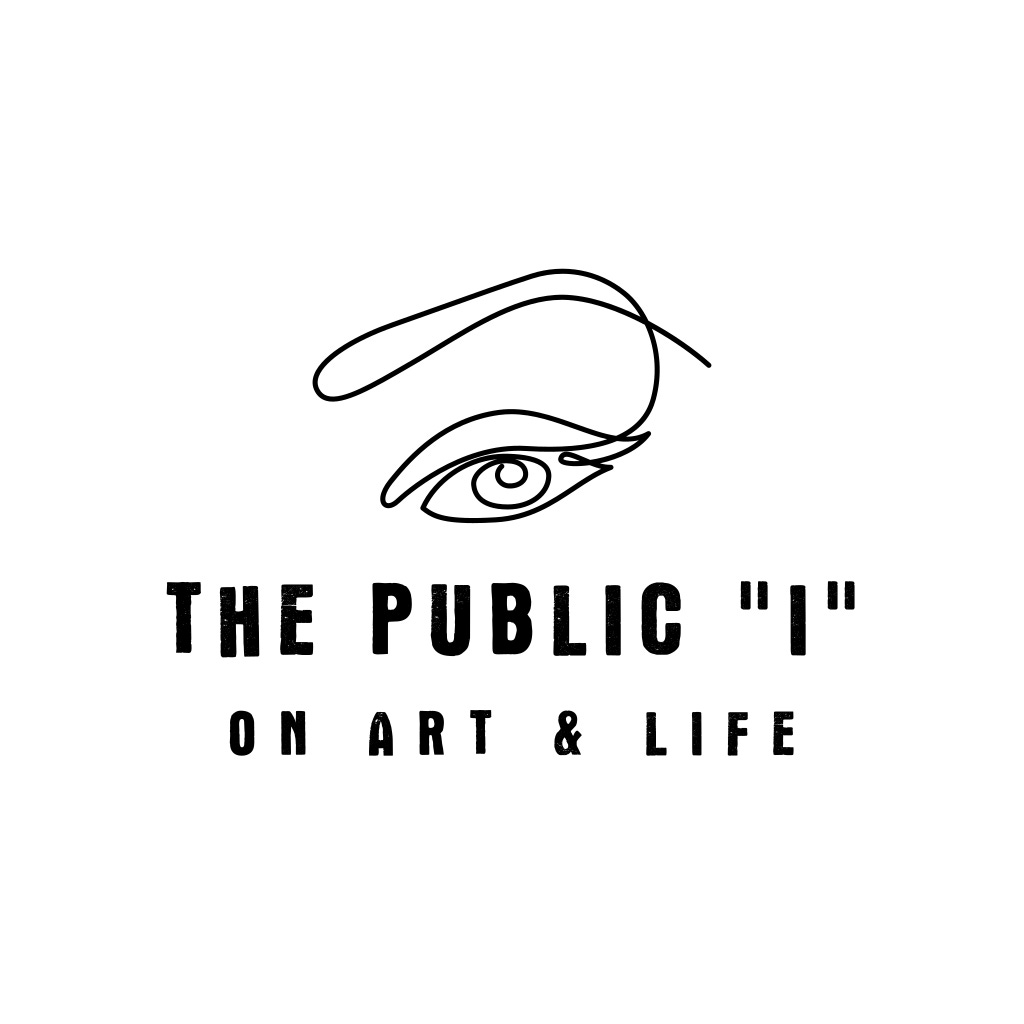This piece is the first of a 3-part series, launching on “The Lot”, the first volume of
SUM FLUX. Read more about this zine and its theme here:
PART I: The Bottom of the Well
The lot stretched out like an exposed nerve, its asphalt cracked and bleeding weeds, the jagged skeletons of unfinished towers clawing at the bruised and bruising sky. It was a place abandoned by design, its purpose erased. Days passed in the silence, each indistinguishable from the next, the sun a pale wound, the moon little more than a blemish.
Rain pooled in uneven depressions, their surfaces scummed with oil and flecks of ash. A handful of cars, relics of a world that no longer moved, stood scattered like broken teeth, their paint blistered and smouldered. The air smelled faintly of rust—it stuck like an acrid film that clung to the back of the throat.
Near the center of the lot was a manhole cover, rimmed with rust, its surface streaked with dark stains. It sat slightly ajar, and the faint scrape marks around its edge were the only indication of any actual use.
From time to time, the wind sent a loose can skittering across the asphalt, the sound hollow and accusatory in the silence.
It was a world of forgotten intent.
Nothing stirred here. Just shadows, long and untethered, creeping over the concrete like they were alive.
***
Julian, the boy, came first, his figure a sharp black contrast against the horizon. He moved like his own prey—quick, precise, always glancing behind. His face was gaunt, worn beyond his years, his skin stretched taut over the bones. There were canyons in his features, carved by hunger and vigilance, his clothes hanging loose on his frame. His eyes, sunken and burnt out. As he grew thinner, he thought his eyes were growing greyer.
He carried a pistol, barrel dulled to a matte sheen, a thing meant to be used, not admired.
Behind him came the girl—Esme. She was smaller, her raincoat too large, a patchwork of scavenged fabric and makeshift repairs. Her hood was pulled low, her face obscured, her steps carefully following his. She walked as if caught in his shadow, moving like the second hand of a clock after the first, her pace slowing when he slowed, quickening when he urged her forward.
Esme, smaller, shrinking inside her raincoat—patched with whatever scraps they’d scrounged, a quilt of failure, of someone else’s castoffs, a map of the end stitched in layers. Her hood hung low, obscuring her face except for the glint in her eyes, always watching, always waiting, her steps trailing his. As if the thread between them was bound too far. The pull became tighter with time, as Julian’s movements quickened. The barbed wire tangled in her gaze, a fence no longer meant to keep anyone out or in but a grave marker to what was lost, leaning into the sky like it might still have meaning. They slumped together against the Punto, a relic barely holding its shape—paint cracked like old skin, tires sunken to the blacktop’s crevices. Julian stared out, not at anything but through it, through the air heavy with ruin, his gaze fixed on the corner of the building where they huddled, listening for their steps to pass. Esme’s eyes darted between the rusted wire and the fractured skyline, scanning the jagged edges of a world still breaking under the weight of its own catastrophe. Behind them, the sharp staccato of machine gun fire erupted, but neither dared to look back at the carnage they'd narrowly escaped, holding their breath as if any sound or movement might summon whatever crawled out of the dark next. The boy led her to the manhole.
The Punto leaned drunkenly, its frame dragging closer to the edge as Julian recalled the taste of alcohol—not a drink, but the burn and haze of it, the way it pleasantly, momentarily unmoored everything. He pushed the car closer and closer to the hole’s edge.
He opened the old golf bag he kept stashed inside, the leather cracked and worn, the zipper barely holding together. Inside, coiled steel rope gleamed faintly, its frayed ends a testament to the night he’d broken into a warehouse to steal it. The pulley system he’d rigged together from scraps of warped wood and salvaged metal looked precarious—uneven beams bolted together, straining under the weight of its own tension. It jutted upward like a gallows, the ropes taut, creaking.
Julian moved stiffly, his upper body lopsided, flopping slightly as he worked. The old wound—just inches from his heart, shattering his collarbone—had healed badly, leaving him with a permanent tilt, a vulnerability he couldn’t afford to show. That was before he’d found Esme. He’d told her his plan back then, though she hadn’t responded, just nodded, her eyes darting between him and the twisted apparatus, pulleys a tangle of the metal wire.
She was about to say something and he silenced her, gesturing for her to climb into the sling. She obeyed without question, her movements mechanical, the ropes groaning under her slight weight. He worked the crank, his hands blistered, raw, each rotation of the handle slow and deliberate. The girl disappeared into the blackness below, her figure swallowed by the shaft’s damp, curving walls. Julian adjusted the strap of his worn canvas backpack, its contents shifting with the motion—a flashlight with fading batteries, a tin of crackers, a dulled knife, a half-empty water bottle, and a bundle of scavenged wires and tools. Esme wore hers slung low, its zipper barely holding together, crammed with a thin wool blanket wrapped around two extra rounds of ammunition and a porcelain plate. The plate, an heirloom from her high-ranking family, bore a delicate floral pattern: cobalt-blue forget-me-nots intertwined with pale pink peonies on an ivory backdrop, its gold-rimmed edges a whisper of imperial opulence. She had saved it the day she fled the soldiers, slipping out the opera house’s backstage exit as they stormed in, clutching the fragile relic as a defiant reminder of all they couldn’t take.
The boy followed, gripping the frayed rope with hands calloused from countless climbs. He lowered himself swiftly, boots scraping against the rough wood of the makeshift ladder Julian had lashed together from salvaged planks. Below, a narrow platform of old boards creaked under his weight. He reached for the longest rope, its fibres worn but still holding, threaded through a series of crude pulleys nailed into beams overhead. With a sharp tug, the rope groaned through the system, and the manhole cover above scraped into place, the echoing grind of steel on concrete sealing them in.
Read Part II December 29th.
Read Part III January 5th.









So so good! I love the way you write, the images you create. Awesome work!!!
"She walked as if caught in his shadow, moving like the second hand of a clock after the first". Your story is amazing but this is my favorite line! I can picture every single detail. Great job!🔥